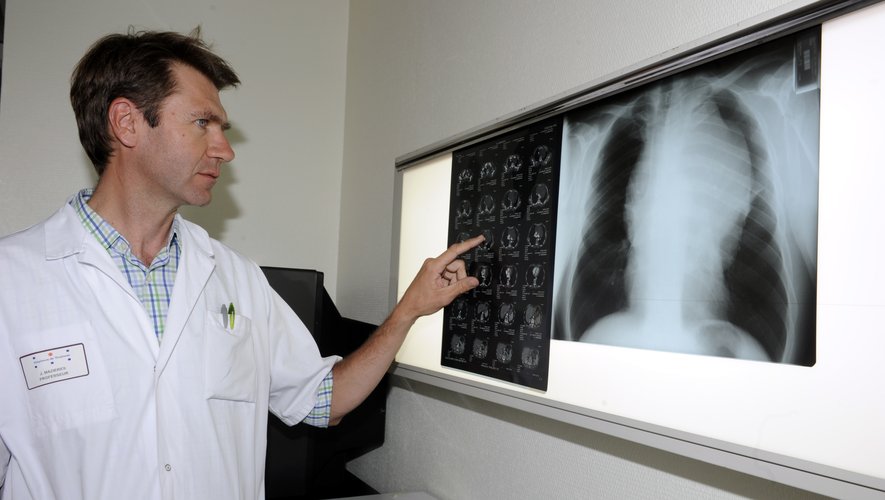An international study, in which researchers from the Toulouse University Hospital participated, has just demonstrated that a molecule called tepotinib was effective in patients with lung cancer with a poor prognosis.
Lung cancer is the 3rd most common cancer in France but the deadliest. If it stagnates in men, it progresses strongly in women. After chemotherapy and immunotherapy, researchers are increasingly moving towards targeted therapies. The international Vision study, the results of which were published in the journal JAMA Oncology, has just demonstrated the efficacy of the Tepotinib molecule in patients suffering from lung cancer carrying a specific mutation called MET. The Toulouse professor Julien Mazières is the reporter of these hopeful results.
Your study shows that a molecule brings new hope of treatment to certain patients. Which ?
We are in the field of personalized medicine, that is to say we have gone from the same treatment that we gave to all patients with lung cancer, to, now, the identification of -groups that represent a total of far fewer patients. But for each subgroup, we have specific treatments. To treat lung cancer, before, we only had chemotherapy, and more recently immunotherapy. Now we have a dozen molecules that are given only to particular subgroups. Here, typically, in the context of this international study, this only concerns 3 to 4% of lung cancers. There are 40,000 deaths per year related to lung cancer in France, if we consider that this concerns 4% of patients, this still makes at least 1000 patients each year who die because of this mutation. That’s a lot of people, but you have to be careful, this treatment doesn’t apply to everyone.
Are these 3 to 4% the most difficult cancers to treat today?
These are cancers for which we have limited therapeutic possibilities. We don’t have anything, we can do chemotherapy. But going for personalized medicine, with targeted therapies, is better. These are molecular subgroups, that is to say that we analyze the DNA of the cancer cells of each patient. If we find an anomaly, in this case in our study the mutation in exon 14 of MET, a mutation of the MET gene, we know that we will give a specific molecule which will block this anomaly. But that will absolutely not work in patients who do not have this anomaly.
What action does this molecule have on the targeted cancer cell?
It’s an anomaly that’s in a gene. When there is this mutation, the gene produces a protein which is abnormal, which transforms the normal cell into a cancerous cell. Thus, when we block this mechanism, we block the development of cancer in patients.
What is the current survival rate for patients with this specific mutation?
There are several stages in lung cancer. There, we are talking about advanced stages, people who have metastases, which cannot be operated on. If they are treated with conventional treatments, ie chemotherapy or immunotherapy, the average survival is 12 to 18 months. It is therefore an aggressive disease.
And thanks to this tepotinib molecule, what results have you obtained?
The first difference compared to other treatments is that it involves taking one tablet a day, it has nothing to do with chemotherapy. Secondly, it’s targeted, which means that there will be very few side effects compared to chemotherapy, it doesn’t cause hair loss, it doesn’t cause nausea. In terms of efficacy, more than half of the patients respond to this targeted treatment and will have a decrease in tumor size of more than 30%. And in all cohorts, we reach or exceed the two-year median survival. And for more than half, when the treatment works, it works for at least a year, whereas we know that with chemotherapy, the effect fades after three to four months. It is therefore undeniable progress. We can speak of patients who respond for a long time or of patients in prolonged remission without it being possible to speak of a cure. Life expectancy is extended and quality of life is improved because the treatment is well tolerated. The effectiveness of the molecule has been demonstrated.
Will it now be delivered to patients affected by this type of cancer?
The Vision study is over, these are final results. We have 313 patients who have been included worldwide and Toulouse has been an active centre. We have the main results, with ongoing patient follow-up. With this type of trial where all patients are treated with the same molecule, there are health authorities, for example in the United States, where that is enough for them to say that the drug must be given to patients. In Europe, and in particular in France, we require in most cases, even if the results are very good, that we do a randomized phase 3 trial, that is to say that half have this treatment , the other half have chemotherapy, for example. The next step will surely be that, even if we do not yet have the response from the French authorities for this test. Discussions will be held in this direction. Is this result going to be enough for this molecule to be offered to all MET patients or will the health authorities require even more information, that will be the discussions in the coming months. As a clinician, I think we have enough data to think that it is an important molecule for patients and that they should be able to access it.

